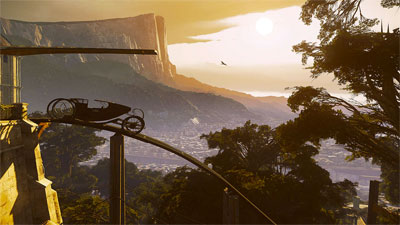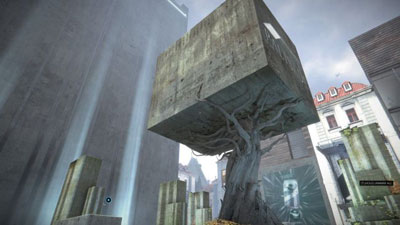Dishonored 2

Dishonored 2, more than anything, is a game that rewards exploration. Exploration of the areas and their wonderful aesthetics. Exploration of the lore – the letters and notes left behind by the inhabitants, but also the stories the environments tell about them. Exploration of the mechanics and how different powers and tools can be combined for marvelous stunts, and exploration of the spaces and how every room opens a multitude of opportunities for how it is traversed. Much like the first Dishonored, you can choose to kill all enemies, ignore the secrets and reach the end of the story for a rather anticlimactic ending, and just like that one it is a lesser game if you do. On the one hand it seems risky to hide the good parts and I don’t really approve of games that artificially lengthen themselves by forcing you to wring an unspecified amount of content out of them, but on the other hand I’m not sure if it would have been as satisfying if it had been unmissable. And unlike most other games with so much player choice, Dishonored 2 rarely – if ever – sacrifices quality, every optional path is presented with incredible detail and balance.
I keep thinking that all developers of stealth games should be forced to play Mark of the Ninja – at the extreme end of selling the idea of being undetectable if you so desire, it offers unparalleled player agency without demanding nearly any skill in return. Dishonored, by comparison, frequently forces you to reload a save because someone happened to spot you from across the room, a stealth takedown wasn’t timed just so or a sleep dart caused an enemy to fall into an abyss and destroy your otherwise murder-less playthrough. It raises some interesting questions though – there are plenty of options for distracting enemies, and even more options for containing a situation where you have already been detected – Dishonored doesn’t aspire to be a pure stealth game as far as the mechanics are concerned, but the disapproving notices you get for being detected and the grading you get after each level strongly tells you that if you were any good at it, you would move through the levels as if no-one ever suspected you were there. The closest analogy is the first Mirror’s Edge, I guess, where the story pushes a barely functional nonlethal path on the player from the get-go. Obviously this is a personal preference thing and I’m certainly more of a completionist than most, but I am wondering if there are ways to sell alternate playstyles that are less obvious. Iji did a pretty good job of hiding its superbly executed pacifist mode, but that’s the only one I can think of that I liked personally.
One of the greater successes of Dishonored 2, though, is that even with all the choice and options given to the player most levels have a very distinct identity with some very unique gameplay opportunities. You can always rely on your staple of violent or stealthy techniques, but using them in different contexts and in tandem with the environment feels very different. Dishonored 2 throws up pretense of being an open world game by having each level start through a different part of the same city, but the missions are wholly unique experiences that the first Dishonored did not deliver on.
I did the quicksave-quickload carousel a bit more than I liked in some places, but Dishonored 2 is definitely a masterfully crafted and immensely well made game.
Deus Ex – Mankind Divided

Mankind Divided fixes a lot of issues that plagued Human Revolution. The opening is decidedly stronger and sets up a mystery that is both more interesting and neater than the one in Human Revolution. It only has the one hub level, but it is a much stronger area than anything Human Revolution had to offer – the solid fashion designs have grown stronger and inspired the world around them to create a place that feels like a very realistic version of what a European city would look like in the setting provided. It is blessedly devoid of ill-fitting comic relief characters and boss fights that require you to use skills you can otherwise ignore.
Sadly, it also gives off some of the sloppy vibe that plagued Human Revolution – a lot of scripts seem malconstructed as conversations are repeated, callouts and button prompts do not work and information that is missing altogether. Those are just the overt things though, there are more subtle issues – animations are sloppy during conversations and do not transition very well, removing a lot of carefully established gravitas from heavy scenes. The game will occasionally task you with transporting unconscious bodies at the mercy of a physics engine that may flip out and throw them far away or so hard into a wall that they die. Navigation often has conflicting controls and enemies, enemies will spot you with little warning and frequently you’re not even informed that you screwed up – in a game that gives you bonuses for maintaining a pacifist, stealthy playstyle this is infuriating to say the least. I found none of the upgrades really offered me new and interesting ways to play, they only made the ways I already played the game less frustrating.
The world is still really well established though, and the story that’s set within it is compelling. The themes of mistrust and discrimination are very relevant and sometimes they become a bit overt, but all of the characters you actually talk to are well developed and relatable – with the rare exception of a few goons, no-one is unambiguously good or bad. It also gets bonus points for doing conversations right, I always felt like I had a good response and the lack of a morality system made it more about establishing character than scoring points – in fact, Deus Ex only makes the narrative difficult when it wants to by making you doubt your allies or forcing you into tough decisions. Whatever other faults the game has, it ties together scenery with characters, background and all other narrative elements.
It was interesting playing this right after Infinite Warfare as it is, in a way, the antithesis of it – a really solid presentation and a mystery to draw you in, but a gameplay that more frequently gets in the way of that than helps it. I really enjoyed the game though, and I am interested in seeing where it goes next.